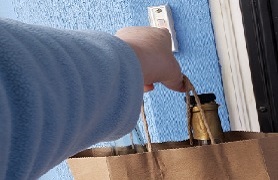Practice Areas
Attorneys
Order Your Whiskey Straight (to Your Doorstep)
New Ohio Law Allows for Personal Delivery of Distilled Liquor and Spirits
 On January 7, 2021, Governor Mike DeWine signed House Bill 674 into law, revising certain liquor laws in the State of Ohio. The new law includes notable changes, such as allowing the delivery of distilled liquor and spirits to the doorsteps of consumers. The law becomes effective in 90 days.
On January 7, 2021, Governor Mike DeWine signed House Bill 674 into law, revising certain liquor laws in the State of Ohio. The new law includes notable changes, such as allowing the delivery of distilled liquor and spirits to the doorsteps of consumers. The law becomes effective in 90 days.
As originally introduced to the House, the bill sought to help the liquor industry recover from the impact of COVID-19 (a.k.a. coronavirus) by including measures to allow liquor sales by bars until 4:00 a.m. and permitting the sale of liquor on Sundays. While these provisions were not included in the version of the bill passed by the Senate and signed into law by Governor DeWine, the new law nonetheless provides convenience for consumers and offers greater flexibility for the liquor sales of certain businesses.
Under the new law, personal consumers may receive deliveries of spirituous liquor to their homes from the Division of Liquor Control. The liquor must be in its original container.
In addition, brewpubs holding A-1-A liquor permits are now exempt from the requirement to obtain a retail food establishment or food service operation license from a local board of health and operate as a restaurant. This will allow brewpubs to:
- Serve unopened, commercially prepackaged meals and nonalcoholic beverages, as well as beer and intoxicating liquor, under exemptions from boards of health regulation; or
- Maintain a schedule with the owner or operator of a licensed mobile retail food establishment or a mobile food service operation to serve food to the brewpub’s customers.
While it also had been a requirement that beer growlers sold for off-premises consumption be made of glass, the new law eliminates this obligation.
Other businesses also are receiving greater flexibility in the sale of liquor under the new law. For example, public airports holding a D-5d liquor permit can expand the area in which beer or liquor from a restaurant may be consumed to include areas such as airport terminals. Furthermore, nonprofit organizations may now be issued an F-11 liquor permit in order to coordinate events involving the promotion and sale of craft beer manufactured in Ohio. The event must have certain characteristics, including:
- The event and its activities are coordinated by the nonprofit organization;
- At least 20 event attendees have A-1c permits and are members of the nonprofit organization; and
- One of the event’s purposes is the introduction, showcasing or promotion of craft beers manufactured in Ohio.
Relatedly, House Bill 669, allowing the sale of alcohol to-go or by delivery by bars, restaurants, small breweries, micro-distilleries and wineries, passed on October 13, 2020. Those permit holders also may expand the area in which they sell alcoholic beverages by the individual drink for on-premises consumption as follows:
- In any area of the permit holder’s property in which sales are not currently authorized and that is outdoors, including the permit holder’s parking area;
- In any outdoor area of public property that is immediately adjacent to the permit holder’s premises, if the permit holder obtains written consent from the local government that owns the property; and
- In any outdoor area of private property that is immediately adjacent to the permit holder’s premises, if the permit holder obtains the owner’s written consent.
Permit holders must notify the Division of Liquor Control and the Investigative Unit of the Department of Public Safety ten days before the expansion. Accordingly, H.B. 669 also exempts the delivery of to-go alcoholic beverages in sealed, closed containers and the consumption of alcohol in the aforementioned expanded outdoor areas from the Opened Container Law.
For more information about these new laws, please speak with one of our business attorneys.
____________________________
Disclaimer: This alert has been prepared by Eastman & Smith Ltd. for informational purposes only and should not be considered legal advice. This information is not intended to create, and receipt of it does not constitute, an attorney/client relationship.
